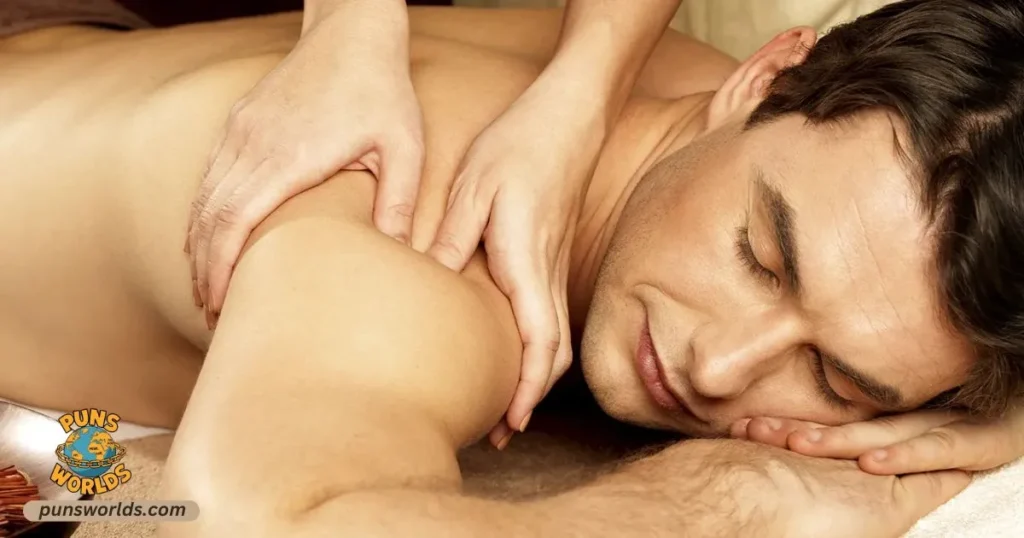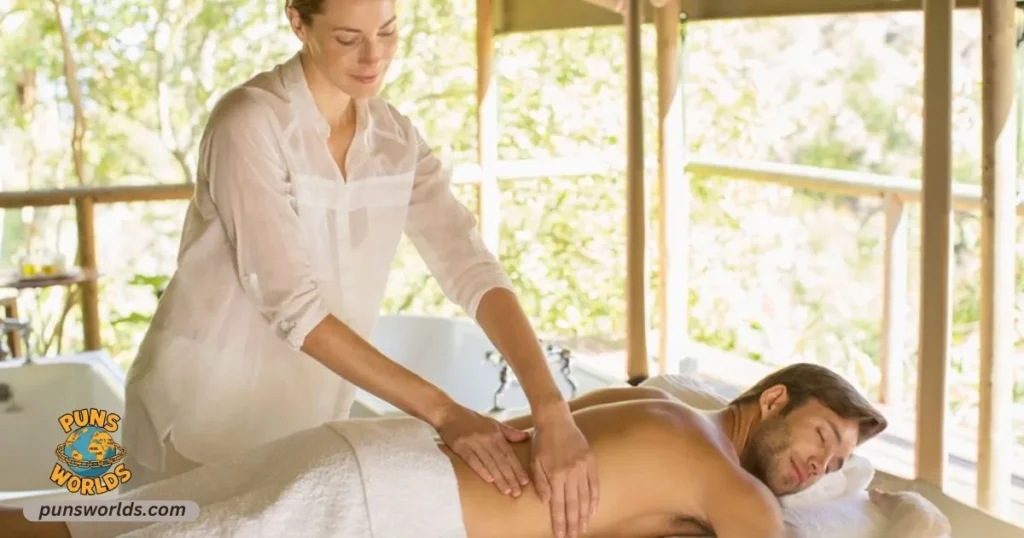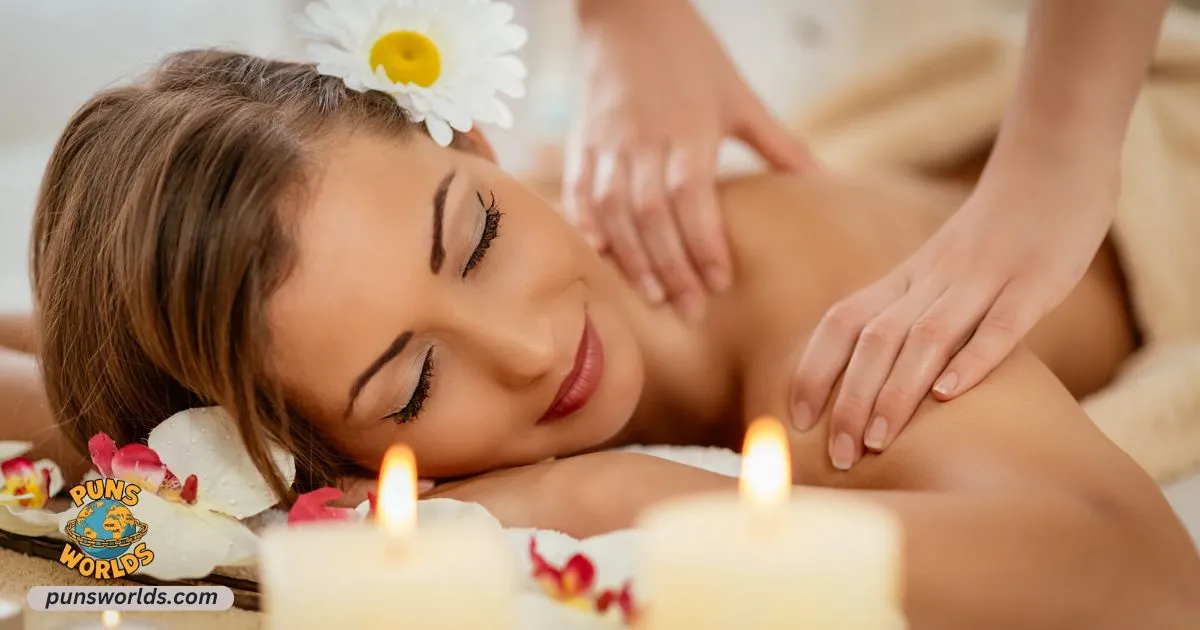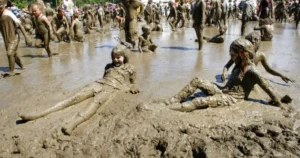“Massage therapy plays a pivotal role in fostering relaxation and alleviating stress, promoting both mental and physical well-being.”
In today’s fast-paced world, stress has become a common companion in many people’s lives. Whether it’s due to work pressures, personal issues, or the constant hustle of modern living, stress can take a toll on both the body and mind. Fortunately, massage therapy offers a solution to ease this burden and promote relaxation.
Through the therapeutic techniques of massage, the body can unwind, muscles can relax, and stress levels can significantly decrease. This article will delve into the role of massage therapy in promoting relaxation and lowering stress, exploring its physical, emotional, and psychological benefits.
By understanding how massage therapy works, individuals can make informed decisions about incorporating this practice into their routine for enhanced well-being.
Funny Massage One-Liner Jokes – Short & Funny Massage Jokes
- I kneaded that massage more than I realized.
- Don’t worry, I’ve got your back—literally!
- Pressing matters? Let’s tackle them on the massage table.
- When life gets tense, just work out the knots.
- Rubbing me the right way always turns my day around.
- I went for a massage and left all my stress behind.
- Getting a massage is like hitting the relaxation jackpot.
- I didn’t choose the massage life; the massage life chose me.
- My massage therapist always kneads to know how I’m feeling.
- I told my therapist I had knots, and she said, “Not anymore!”
- Sometimes you just need to knead your worries away.
- I asked for deep tissue, but this is deep commitment!
- Massage: where you go to get pressure without the stress.
- Don’t be afraid to let the massage therapist rub you the right way.
- I’ve got no strings attached, but plenty of knots to untie.
- I’m addicted to massages—they’re my knead-to-have therapy.
- A good massage can really press your reset button.
- It’s amazing how much tension you can release with a gentle touch.
- Massage therapy—because life doesn’t come with a stress-free button.
- My massage therapist and I have a touching relationship.
- I didn’t realize how tense I was until I felt de-stressed.
- I’m feeling so relaxed, I think I just melted into the table.
- Knots are like secrets—they unwind with a little pressure.
- I used to carry stress, but now it’s been pressed out of existence.
- My massage therapist is an expert in muscle manipulation and magic.

Massage QnA Quip – QnA Jokes & Puns about Massage
- Q: What’s a massage therapist’s favorite movie?
A: “The Kneading Edge.” - Q: Why did the massage therapist become a detective?
A: They were great at finding knots! - Q: What do you call a massage therapist who’s always on time?
A: A punctual pressure point expert. - Q: Why do massage therapists make great partners?
A: They always know how to work out problems. - Q: Why did the muscle go to therapy?
A: It was too tense. - Q: What’s a massage therapist’s favorite exercise?
A: Stretching the truth! - Q: Why did the stressed-out person book a massage?
A: They couldn’t handle the pressure anymore. - Q: How do massages and puns go together?
A: They both knead a little pressure to work. - Q: Why did the massage therapist break up?
A: They couldn’t handle the tension. - Q: What’s a massage therapist’s motto?
A: Keep calm and apply pressure. - Q: What does a tight muscle say after a massage?
A: “Ah, finally relaxed!” - Q: Why don’t massage therapists get angry?
A: They know how to release pressure. - Q: What do muscles do when they’re stressed?
A: They get all tied up in knots! - Q: Why did the muscle go to the spa?
A: It needed to unwind. - Q: What’s a massage therapist’s superpower?
A: Finding tension where you didn’t even know you had it. - Q: Why did the shoulder feel left out?
A: It wasn’t getting any attention. - Q: What’s a massage therapist’s least favorite knot?
A: The do-not-disturb sign! - Q: Why did the back need a massage?
A: It was carrying too much weight on its shoulders. - Q: Why do knots dislike massages?
A: They always get untied. - Q: What did the client say after the massage?
A: “That was knot bad at all!” - Q: How do you compliment a great massage therapist?
A: “You’ve really got the magic touch!” - Q: Why did the massage table feel proud?
A: It always supports people. - Q: What did the shoulder say to the neck?
A: “We need to stop carrying so much tension!” - Q: Why do massages and naps go hand-in-hand?
A: Because both help you press reset. - Q: What’s a massage therapist’s favorite type of bread?
A: Kneaded dough.
Wonderdays Experience Puns & Jokes
The Science Behind Massage Therapy and Stress Relief
- Understanding the physiological impact of stress on the body.
- The role of the nervous system in stress response.
- How massage therapy affects the autonomic nervous system.
- The connection between massage therapy and the release of endorphins.
- The importance of muscle relaxation in stress reduction.
- The role of massage in lowering cortisol levels.
- How deep tissue massage targets stress-induced muscle tension.
- The impact of regular massage therapy on reducing overall stress.
- How massage therapy contributes to improved sleep quality.
- Enhancing circulation through massage and its stress-relief effects.
- The benefits of hot stone massage for deep relaxation.
- The role of aromatherapy combined with massage for stress relief.
- Massage techniques that focus on the shoulders and neck.
- How massage can reduce headaches caused by stress.
- Reflexology’s role in relieving stress through foot massage.
- The role of Swedish massage in alleviating tension and stress.
- How lymphatic drainage massage aids in the removal of stress-related toxins.
- The link between improved immune function and stress reduction via massage.
- Massage’s ability to calm the mind and release mental stress.
- Using massage therapy to break the stress cycle.
- How trigger point therapy can target chronic stress points.
- The psychological benefits of massage therapy in promoting relaxation.
- The connection between relaxation and the reduction of anxiety.
- Addressing both physical and emotional stress with therapeutic massage.
- The importance of consistent massage for long-term stress management.
- How massage therapy encourages mindfulness and present-moment focus.
- The effect of massage on heart rate and blood pressure.
- Alleviating stress-induced muscle stiffness and pain.
- The role of massage therapy in reducing fatigue from chronic stress.
- Improving joint flexibility through regular massage sessions.
- How massage promotes a feeling of relaxation beyond the physical body.
- Combining massage with breathing techniques to enhance relaxation.
- The difference between relaxation massage and therapeutic massage.
- The role of massage therapy in relieving emotional tension.
- Benefits of scalp massage in reducing stress and improving relaxation.
- Enhancing mood through massage therapy and stress relief.
- The role of massage in restoring energy balance and calming the body.
- How massage helps in clearing mental clutter and increasing clarity.
- The importance of regular massage for emotional well-being.
- Using massage therapy to manage stress-related skin issues.
- How massage techniques vary to target different stress points.
- The impact of massage on blood flow to the brain for mental clarity.
- Massage therapy’s role in reducing the impact of stress on aging.
- The stress-reducing benefits of prenatal massage.
- How massage can reduce stress during times of grief or loss.
- The calming effect of massage on the sympathetic nervous system.
- Massage’s ability to improve mood through neurochemical release.
- The connection between muscle tension and mental stress.
- How massage therapy can foster a state of calmness and serenity.
- Personalizing massage therapy for optimal stress reduction.
The Emotional Benefits of Massage Therapy in Reducing Stress
- The link between emotional health and physical tension.
- How massage therapy promotes emotional balance.
- The role of touch in releasing stored emotions.
- Massage therapy’s ability to reduce feelings of anxiety.
- How therapeutic massage aids in managing depression symptoms.
- Using massage to enhance mood and foster a sense of well-being.
- The calming effects of massage on nervous energy.
- How massage helps regulate mood swings.
- The role of massage in overcoming emotional exhaustion.
- Improving emotional resilience through regular massage.
- How massage can ease emotional pain and grief.
- The impact of massage on reducing emotional triggers.
- Massage as a tool for self-care and emotional healing.
- How massage therapy fosters a sense of emotional connection.
- Using massage to address emotional blockages.
- The emotional benefits of a relaxing massage environment.
- The therapeutic role of massage in stress management during life transitions.
- Reducing emotional burnout with regular massage sessions.
- The impact of massage on social and emotional relationships.
- How massage promotes emotional recovery after trauma.
- How massage can be a coping mechanism for emotional stress.
- The role of massage in relieving anxiety-related physical symptoms.
- Massage therapy’s ability to soothe overwhelming emotions.
- Addressing emotional stress through massage techniques.
- How deep pressure massage can release emotional tension.
- The benefits of receiving massage as a form of emotional self-care.
- The nurturing role of massage in promoting emotional well-being.
- How massage helps to relax the mind and release mental strain.
- Creating a space for emotional release with massage therapy.
- The role of massage in restoring a sense of control during stressful times.
- How massage therapy helps to ground emotions and bring clarity.
- Using massage to combat stress-related irritability.
- How massage helps to cultivate a positive emotional state.
- The effect of massage on emotional regulation.
- Using massage to promote feelings of peace and serenity.
- How massage therapy supports emotional detoxification.
- The stress-relieving effect of nurturing touch in massage.
- How massage enhances the emotional benefits of relaxation.
- Emotional relaxation and the role of massage in releasing mental tension.
- The power of massage in breaking free from emotional overwhelm.
- How massage therapy can create a safe emotional space.
- The connection between massage and self-love.
- The influence of massage on positive emotional outlook.
- Using massage therapy for self-compassion and stress reduction.
- The emotional relief massage offers for those suffering from stress.
- The healing power of touch in releasing emotional burdens.
- How massage promotes emotional clarity in stressful times.
- Creating emotional harmony through massage therapy.
- The role of massage in managing chronic emotional stress.
- How massage can lift the emotional weight of a stressful day.
Techniques Used in Massage Therapy for Stress Relief
- Swedish massage for overall relaxation.
- Deep tissue massage for chronic muscle tension.
- Hot stone massage to ease stress and tension.
- Aromatherapy massage and its stress-relieving effects.
- Shiatsu massage for restoring balance and reducing stress.
- Reflexology: The benefits of foot massage for stress relief.
- Trigger point therapy for stress-related muscle pain.
- Myofascial release techniques for relaxing stiff muscles.
- Lymphatic drainage massage to support detoxification and relaxation.
- Prenatal massage to reduce stress and promote relaxation.
- Sports massage to relieve stress from physical exertion.
- Thai massage: Stretching and stress relief.
- Aromatherapy and essential oils combined with massage.
- Craniosacral therapy for calming the nervous system.
- Tui Na massage and its stress reduction benefits.
- Indian head massage to relieve stress from the upper body.
- Chair massage for on-the-go stress relief.
- Combining massage with breathing techniques for optimal relaxation.
- The benefits of lymphatic massage in reducing stress.
- Using massage as a natural remedy for tension headaches.
- Acupressure points in massage to target stress.
- The effect of gentle massage on the autonomic nervous system.
- How massage therapy can help balance emotional stress.
- Using massage for stress relief after a long workday.
- Techniques used to massage stress away from the neck and shoulders.
- Full body massage for stress relief from head to toe.
- Reflexology techniques targeting stress points on the feet.
- The healing touch of Swedish massage to release tension.
- Healing properties of long, flowing strokes in stress relief.
- The role of massage therapists in tailoring techniques to reduce stress.
- Combining massage with guided meditation for relaxation.
- Head, neck, and shoulder massage to relieve stress.
- The use of deep kneading techniques to alleviate muscle stress.
- Soft tissue massage for releasing built-up tension.
- How hot towels are used in massage to promote relaxation.
- Using massage to improve postural stress and alignment.
- The impact of light touch massage on stress relief.
- The benefits of circular motions in massage for stress reduction.
- Combining massage with sound therapy for a deeper relaxation experience.
- The role of deep strokes in muscle relaxation during a massage.
- Using massage as a stress buster in workplace wellness programs.
- How specific strokes target stress-related muscle tightness.
- Benefits of acupressure combined with traditional massage techniques.
- The holistic benefits of combining massage with Reiki energy healing.
- Combining cupping therapy with massage for stress relief.
- How massage relieves stress by promoting blood circulation.
- Using massage to improve range of motion and reduce stress.
- The art of trigger point therapy in stress relief.
- How massage helps to loosen up the body’s response to stress.
- Creating a personalized massage experience to relieve stress effectively.
How Regular Massage Therapy Can Improve Overall Mental Health
- Massage therapy and its impact on mental clarity.
- The role of massage in reducing anxiety.
- How regular massage can combat feelings of depression.
- Improving focus and concentration through stress reduction techniques.
- The connection between regular massage and better emotional regulation.
- Using massage to reduce mental fatigue.
- How massage promotes an overall sense of well-being.
- Increasing productivity by lowering stress with massage therapy.
- How massage promotes mental relaxation and emotional recovery.
- The mental benefits of physical relaxation from massage.
- How massage supports emotional release in a therapeutic environment.
- Using massage to help individuals with PTSD manage symptoms.
- The cognitive benefits of incorporating massage into a mental health routine.
- How massage therapy can break the cycle of overthinking and anxiety.
- Improving mental resilience through regular massage sessions.
- How massage can help prevent burnout in high-stress jobs.
- The role of massage in addressing mental health during life transitions.
- The mental clarity gained from reducing physical stress with massage.
- The link between relaxation from massage and improved mental health.
- Using massage therapy to alleviate cognitive stress from daily life.
- Improving self-awareness and mindfulness through massage therapy.
- Massage therapy as a tool for reducing mental chatter.
- The calming effects of massage on mental health conditions.
- How regular massage leads to better stress management skills.
- Using massage therapy for emotional and psychological well-being.
- Enhancing mental clarity through muscle relaxation.
- How massage therapy boosts self-esteem and self-worth.
- Reducing mental tension through targeted massage techniques.
- The relationship between mental relaxation and improved cognitive function.
- How massage encourages a positive mental outlook.
- The long-term mental health benefits of consistent massage.
- Using massage to break free from mental exhaustion.
- How regular massage helps manage stress during tough emotional periods.
- The connection between stress management and mental health improvement.
- How massage therapy contributes to better coping mechanisms for mental challenges.
- The role of massage in overcoming mental stress from traumatic events.
- Mental rejuvenation achieved through regular massage practices.
- Using massage to enhance emotional intelligence.
- The effect of massage on mental stress and physical discomfort.
- The power of massage in achieving mental relaxation.
- How massage therapy impacts the balance between mind and body.
- How regular massage improves focus and reduces mental clutter.
- Massage therapy as part of an overall mental health maintenance plan.
- How regular massage supports long-term mental wellness.
- Stress relief from massage as a cornerstone for mental clarity.
- How massage improves decision-making abilities by reducing mental tension.
- Restoring mental balance through consistent massage therapy.
- Using massage as an effective strategy to reduce mental health issues.
- How stress relief from massage enhances brain function.
- Massage therapy: A tool for improving overall mental health.
The Science Behind Massage Therapy’s Relaxation Effects
- The autonomic nervous system and massage
- Massage and its effect on the parasympathetic nervous system
- Releasing endorphins and their role in stress relief
- The role of cortisol reduction in stress management
- How massage therapy influences blood pressure
- The link between muscle relaxation and mental relaxation
- Blood circulation improvement and stress reduction
- Massage as a natural painkiller
- Massage’s role in balancing the nervous system
- How deep tissue massage helps in reducing anxiety
- Massage as a tool for mental clarity
- Neurochemical changes during massage
- The role of touch in fostering emotional well-being
- Therapeutic effects of pressure point stimulation
- The mind-body connection enhanced by massage therapy
- How massage helps to break the stress cycle
- The relaxation response vs. the stress response
- Massage and its impact on the limbic system
- The long-term benefits of regular massage sessions
- Massage’s influence on mental resilience
- How massage supports emotional stability
- Massage therapy and the improvement of overall mental health
- The connection between muscle tension and psychological stress
- Massage’s role in emotional regulation
- The endorphin boost: nature’s natural relaxant
- How massage can alleviate both physical and emotional tension
- Massage as an emotional reset
- How different types of massage target specific stress triggers
- The effect of massage on the body’s pain perception
- The role of massage in managing chronic stress
- Massage and its impact on sleep quality
- Improved posture and relaxation through massage
- Stress relief in specific areas: back, neck, and shoulders
- Massage as an integrative therapy in mental health care
- The effect of massage on sleep cycles and relaxation
- Relaxation after a sports injury: therapeutic massage
- Massage therapy’s influence on feelings of security and comfort
- Massage and its effects on reducing mental fatigue
- Understanding the relaxation benefits of light versus deep massage
- How massage activates the body’s relaxation response
- Massage’s impact on the body’s immune system response
- The role of massage therapy in mindfulness and meditation practices
- Massage as a tool for balancing the emotional state
- Using massage to foster a sense of calmness and tranquility
- Reducing feelings of overwhelm through therapeutic touch
- The science of touch and its relaxation benefits
- Massage and its ability to promote deep rest and relaxation

- The connection between massage therapy and lowering the heart rate
- Massage as a preventative measure against stress
- How massage supports healthy brain activity and relaxation
Massage Techniques for Stress Relief: A Look at Different Modalities
- Swedish massage: a gentle approach to relaxation
- Deep tissue massage: targeting stress and tension
- Hot stone massage: soothing muscles and the mind
- Aromatherapy massage: stress reduction through scent
- Shiatsu: pressure point therapy for stress relief
- Thai massage: stretching and releasing tension
- Reflexology: the healing power of the feet
- Sports massage: preventing stress from physical strain
- Lymphatic massage: promoting detoxification and relaxation
- Cupping therapy: relieving stress through suction
- Prenatal massage: stress relief for expecting mothers
- Trigger point therapy: reducing stress with targeted pressure
- Lomi Lomi: Hawaiian massage for stress and energy flow
- Craniosacral therapy: a gentle touch for relieving stress
- Chair massage: quick stress relief during work breaks
- The role of music in enhancing massage relaxation
- Hot and cold therapy combined with massage for stress relief
- Massage therapy for post-traumatic stress disorder (PTSD)
- The connection between breathing techniques and massage
- Tension relief with Thai stretching and compression
- How massage therapy can improve mood and energy levels
- The role of stretching in stress management during massage
- The benefits of a spa-like environment in reducing stress
- How aromatherapy oils enhance relaxation during massage
- Combining massage with mindfulness for deeper relaxation
- Massage therapy for improving overall body posture and stress relief
- Healing benefits of a warm stone massage for relaxation
- Relaxation achieved through reflexology foot techniques
- How Shiatsu targets stress through meridian lines
- The release of tension using stretching in Thai massage
- Massage with CBD oil for enhanced relaxation
- Benefits of Ayurvedic massage for stress management
- Massage therapy’s role in reducing muscle soreness and stress
- Fascia release massage: reducing stress through muscle relaxation
- The role of breathwork during massage therapy sessions
- Improving circulation and relieving stress with lymphatic drainage massage
- How pressure point massage can improve emotional health
- Integrating massage therapy into daily routines for stress management
- Massage therapy as part of a holistic approach to wellness
- How chair massages at the workplace help with stress relief
- The effectiveness of short-duration massage for stress management
- Massage and its benefits in reducing anxiety during travel
- Techniques for reducing neck and shoulder stress through massage
- The influence of massage therapy on reducing mental fatigue
- The deep relaxation benefits of a 90-minute massage session
- How regular massage sessions lead to better stress resilience
- Massage therapy’s effectiveness in reducing work-related stress
- The role of consistent massage therapy in managing chronic stress
- Massage and its positive effect on the central nervous system
- Techniques for self-massage to relieve stress at home
FAQs
How does massage therapy reduce stress?
Massage therapy helps by promoting muscle relaxation, lowering cortisol levels, improving circulation, and releasing endorphins, all of which contribute to stress reduction.
Is massage therapy effective for emotional stress?
Yes, massage therapy can help alleviate emotional stress by releasing built-up tension, promoting relaxation, and fostering emotional well-being through nurturing touch.
How often should I get a massage to experience stress relief?
For optimal stress relief, it’s recommended to get a massage at least once a week, though the frequency can vary based on individual needs.
Can massage therapy improve sleep quality?
Yes, regular massage therapy can improve sleep quality by reducing stress and relaxing the body, which can promote a more restful sleep.
What is the best type of massage for stress relief?
Swedish massage, deep tissue massage, and aromatherapy massage are particularly effective for relieving stress and promoting relaxation.
Conclusion
Massage therapy plays a vital role in promoting relaxation and lowering stress. Whether addressing physical tension, emotional exhaustion, or mental clarity, it offers a holistic solution for overall well-being.
Regular massage therapy can significantly enhance stress management, leading to better physical health, improved emotional balance, and a more positive mental state. By incorporating massage into one’s routine, individuals can experience lasting benefits in reducing stress and fostering a more relaxed, healthy lifestyle.

I’m Jane Austen, and I bring a touch of classic wit to Puns Worlds. My puns blend humor with a timeless elegance, offering readers a delightful escape into wordplay.











